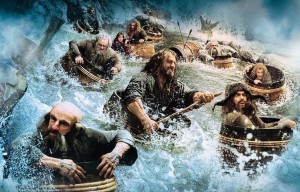Saturday's talks and events at Writers Week included the launch of The Curioseum at Te Papa, with readings
from six of the authors involved, and the Weta Digital session on visual
effects in the Lord of the rings and The hobbit movies. It's impressive but
oddly disconcerting to see how scenes are built up using various clever techniques so that by the end, what
you think you are seeing isn't what you are seeing at all. (Legolas shooting
off that arrow and leaping onto the back of Gimli's horse? - actually it was
the digital Legolas who made that amazing leap. Dwarves barreling down the
river? - same thing - digital dwarves -sometimes digital river.)

But the session at 4.45pm was definitely one of the most popular:
Midwives or Meddlers - Eleanor Catton in conversation with one of her Granta
editors, Max Porter.

Eleanor Catton commented that they weren't sure which one
of them was supposed to be chairing the session, but their informal
conversational style worked perfectly and Eleanor seemed to be finding some of
Max's answers as interesting and revealing as the audience did.
Eleanor recalled sitting next to Germaine Greer at a previous
Writers and Readers Week. When one of the authors on stage made a comment about
having a good editor, Germaine Greer leant across to Eleanor and whispered loudly,
"there' s no such thing!"
Is there such a thing? and what is the role of the editor? - a
profession that Max defined as "baffling", "irritable" and
endangered by the rise of self-publishing on Amazon.
I've never thought much about the role of the editor in general,
or from the editor's point of view. I've worked with some wonderful editors and
I know the difference they can make to a piece of text: the glaring errors they
pick up, and the many more subtle techniques they use to make a manuscript
better. But I hadn't really understood the different ways that different authors
might need editing, from some who need a deep "in the trenches" line edit
to others who need more help in other areas, like sales and marketing. Max said
that "editor-author has to be a bespoke relationship."
From a general discussion about editing, Eleanor and Max
moved to a more particular discussion of editing The luminaries, a process which Max took over halfway through from
another editor. He praised Eleanor as "a self-editing writer, combining
competency with self-critique" in a way that was very unusual - but he did
also talk (very tactfully) about the stresses involved with editing such a
complex manuscript that wasn't always meeting all the deadlines. Hearing
Eleanor talk about the worth of creative writing courses to her, and how she
sees them now as a creative writing teacher, was also fascinating.

No comments:
Post a Comment